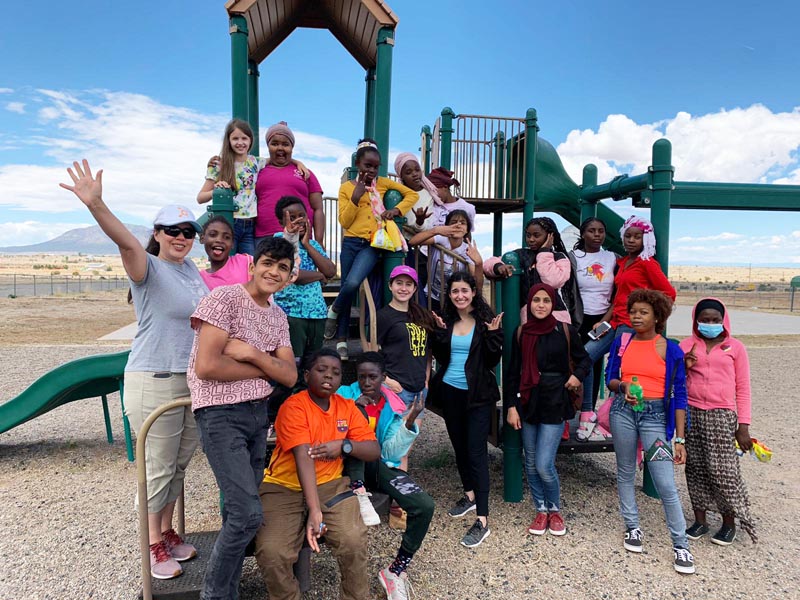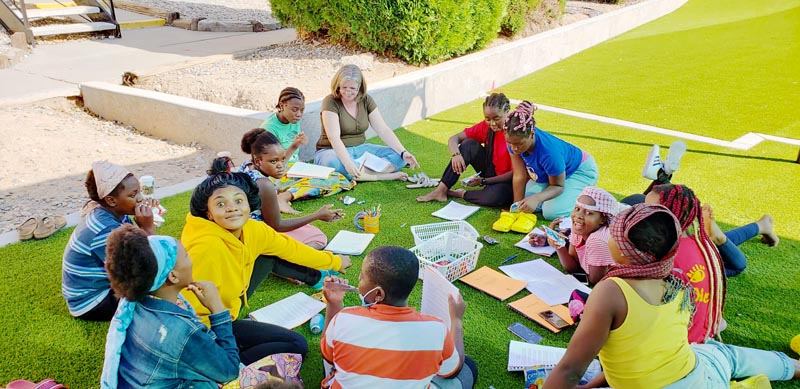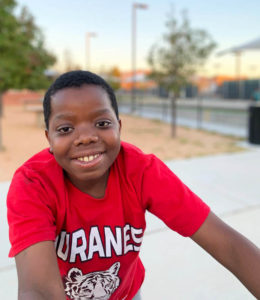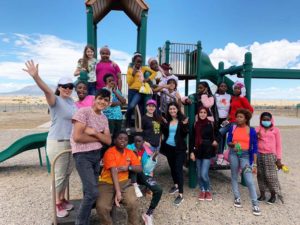



By Leslie Farrell
On the east side of Albuquerque, New Mexico, near the ever-color-changing Sandia Mountains, is a beautifully diverse neighborhood called Singing Arrow. Amalia Giebitz knows the area well.
Giebitz served for years as a second-grade teacher at Janet Kahn School of Integrated Arts, a public elementary school in Albuquerque, retiring in 2019 to pursue her passion for serving the Baha’i Faith. As Area Teaching Committee secretary and a former janitor at the Baha’i World Center in Israel, she has performed a great deal of service to the Faith. Now her heart called her to make this service full time.
Visits with friends
Upon pursuing her new direction, Giebitz’s first task was to visit her former students living in the Villa Del Sol apartment complex in Singing Arrow. She was intrigued by the various backgrounds of the residents, and challenged by language barriers — Swahili, in particular.
At a brunch with friends, including some Baha’is, Giebitz talked about her experience and her goals for the community. “If only we had someone who spoke Swahili,” she lamented. The hostess, Esther Kumi, raised her hand and quietly announced, “I speak Swahili.” Delighted and surprised, Giebitz asked Kumi, who had grown up in Kenya, to accompany her to the Singing Arrow neighborhood to meet some of the neighbors.
A few days later Kumi and Giebitz, along with their friend Julie Mirkovich and Giebitz’s 10-year-old daughter, Maya, visited the Singing Arrow playground. A crowd was out enjoying the day and upon their approach, children shouted out “Maya!” and the visitors were all warmly welcomed.
“Sixty seconds later, I had a skirt of children because they knew me from school. I told them ‘I stopped teaching at the school so I could hang out with you and start children’s classes here,’” Giebitz told the kids.
The children were so excited and one of their grandmothers cautiously approached. Kumi spoke to her in Swahili and according to Giebitz, “They hugged and had a love fest…The grandmother told us, ‘You are welcome anytime.’”

Around that time, Kumi also decided to serve the Baha’i Faith full-time. As she and Giebitz and others in the area learned more about the needs of this community, they created more activities. They started regular children’s classes, junior youth groups, and devotionals.
One significant gathering was a 10-day youth intensive held in a youth hostel in the Sandia mountains. This was organized by the Regional Training Institute, which employs a series of books to foster the capacity of participants to serve humanity. During the intensive, the young people studied the first book in the series in two days, followed by books three and five.
Some of the youth began hosting children’s classes in July of 2019 and continued through the summer and fall. But when winter came, it was too cold to hold classes outside and they struggled to find an indoor venue. They asked to use a community room in the apartment complex where many of them lived, but their requests were ignored by the management.
The pandemic hit that spring, creating a new challenge. Classes were held online, but it was difficult to keep the children and youth engaged.
In an attempt to bring people together, the Baha’is created a gardening project. They planted vegetables in storage bins. In almost no time, their junior youth group expanded from five to 12, as a Syrian family and a recently arrived Kinyarwanda-speaking family were attracted to the endeavor.


Children’s classes were resurrected outside as well, primarily for younger siblings of the junior youth. When a call was put out for a lead children’s class teacher, Diana Vaughn-Nielsen volunteered, and she found five other teachers to teach classes for those in Kindergarten and Pre-K.
The Villa del Sol apartment complex was sold and the new owners are very supportive of the Baha’is’ efforts and activities. They are generous with the community room, which is now being used for children’s classes.
Even that space was not big or flexible enough, however. It became apparent that it would be beneficial to rent an apartment for the sole use of Baha’i activities. Contributions from individual Baha’is and Baha’i institutions were used to rent an apartment, for about $800 per month, starting in November 2020.
As time went on, they realized it would be beneficial if a Baha’i family lived in the neighborhood. Coincidentally, Kumi had been considering a move for her and her two daughters, ages 12 and 19, who also participate in the Baha’ activities. Everything fell into place. They decided to move into the mobile home community near the apartment building. So now Kumi’s home serves as a place for youth devotionals and junior youth groups..
“We were being asked to provide homework help. We were stretched thin, but we tried. We finally decided to ask for help,” Giebitz says. They now have six friends who provide four hours of homework help a week. Giebitz says they are all learning together and that the team reflects every week about how they can support each other. “No one feels like ‘this is all on me’,” she says.
Because of their efforts, the Singing Arrow neighborhood now supports two junior youth groups and two children’s classes, a youth study circle, plus regular devotionals and other activities. There are plans to add a third children’s class.


“One of the most significant things about this is that…we walked into a neighborhood where we were known,” Giebitz explains, adding that they’d like to do more outreach, but first want to be sure their efforts are firmly established.
Giebitz says they have been visiting families of children who are involved with the classes to help them understand what the kids are learning. She says she has noticed changes, such as children now praying at home, who hadn’t before.
A fun activity they all enjoy is a monthly drumming devotional outside on the neighborhood’s green space. The gathering is informal, involving sharing food, prayers, and music. Prayers are sung in English and Swahili. “I’ve learned the Remover of Difficulties [a Baha’i prayer] in Swahili,” Giebitz says.
Besides the Congolese family, others are from Syria and Jordan and speak Arabic.The community has expressed a desire for English teachers, but right now, “Our resources are maxed,” Giebitz says.
For others wishing to transform neighborhoods, Giebitz recommends starting in your own neighborhood and finding a partner. “Commit to the population; this population deserves to know about the teachings of Baha’u’llah even if they never become Baha’is. Make one connection….Foster that friendship and pray with them based on what their needs are,” she says.


![]()
![]()
Whether you are exploring the Bahá'í Faith or looking to become an active member, there are various ways you can connect with our community.
Please ensure that all the Required Fields* are completed before submitting.